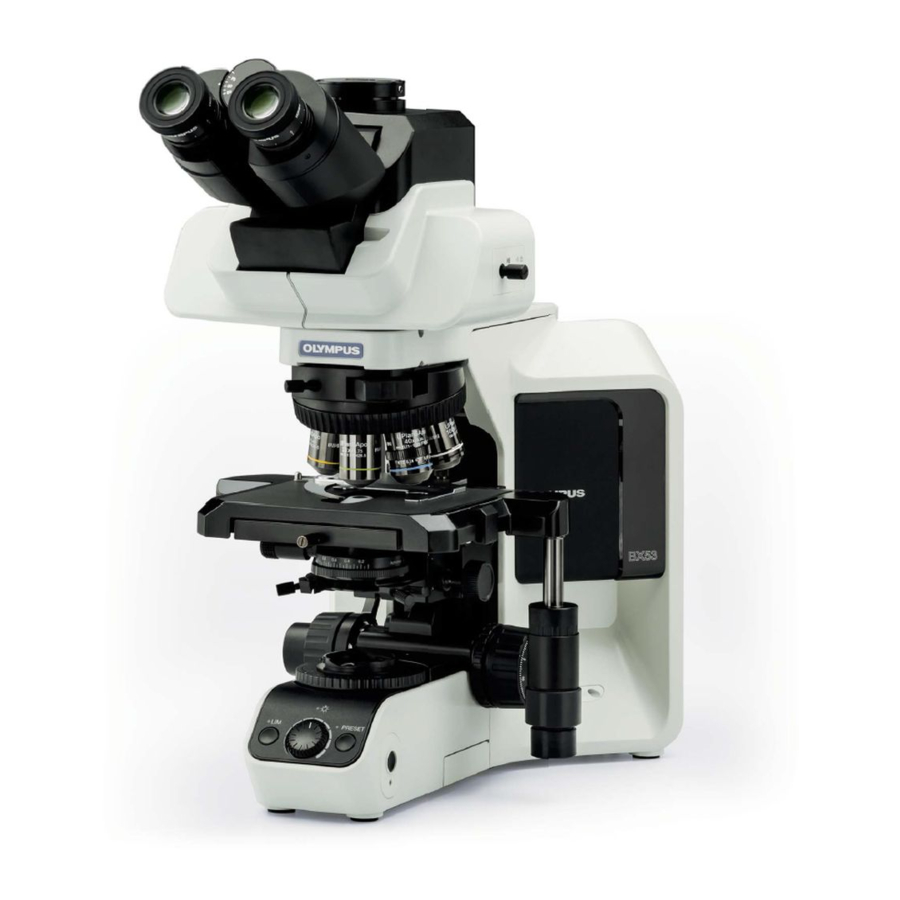Olympus BX3-RFAS Manuale di istruzioni - Pagina 14
Sfoglia online o scarica il pdf Manuale di istruzioni per Microscope Olympus BX3-RFAS. Olympus BX3-RFAS 36. Coded function system
Anche per Olympus BX3-RFAS: Manuale di istruzioni (16 pagine), Manuale di istruzioni (16 pagine)

3
Turning the Power Supply Unit On
Set the main switch to " I " (ON). The illumination light will stop flickering and will stabilize in 5 to 10 minutes after ignition.
} The discharge type mercury burner may not be ignited from the beginning on rare occasions due to its characteristics.
In this case, set the main switch to "
CAUTION
· To extend the mercury burner life, do not turn it on and off at short interval. If you want to interrupt observation
for a while in less than 2 hours after ignition, do not switch the power supply unit to off but simply close the
shutter of the illuminator during the interruption period.
· The mercury burner cannot be reignited until the mercury vapor has cooled down and liquefied. Before re-
igniting a mercury burner, wait for about 10 minutes after the last time it was turned off.
} For the sake of safety, the power supply to the lamp housing is shut down if the lamp housing is opened while the burner
is on. If this happens, set the main switch to "
Whenever you want to open the lamp housing, make sure that it has cooled down enough after use.
After replacing the mercury burner, reset the hour counter by holding its reset button till "0.0" is displayed.
CAUTION
3
1
11
2
Fig. 1
" (OFF), wait for 5 to 10 seconds, then set it again to " I " (ON).
" (OFF), wait for more than 10 minutes, and then set it again to " I " (ON).
4
Centering the Field Iris Diaphragm
1. Close the light path by sliding the shutter knob @ to position marked {.
2. Engage a mirror unit other than the ones for U-excitation (U-FUW, U-FUN,
U-FUNA) in the light path by rotating the turret.
3. Open the light path by sliding the shutter knob to position marked \.
4 Engage the 10X objective in the light path, place the specimen on the
stage and bring the image into approximate focus.
5. Pull out the field iris diaphragm knob 2 to minimize the field iris diameter.
6. Fit the Allen screwdriver provided with the microscope frame in the two
field iris centering screws 3 and adjust so that the iris image comes at
the center of the field of view.
7. While pushing in the field iris diaphragm knob 2, enlarge the field iris
diaphragm until the field iris image inscribes the field of view. If eccentricity
is found after this, try centering again.
8. Enlarge the field iris diaphragm.
Effects of Field Iris Diaphragm
The field iris diaphragm restricts the diameter of the beam of light entering
the objective and thus excludes extraneous light, improving image
contrast. The field iris diaphragm also functions to prevent color fading
of fluorescent light in other part than the observed region.
(Fig. 1)
